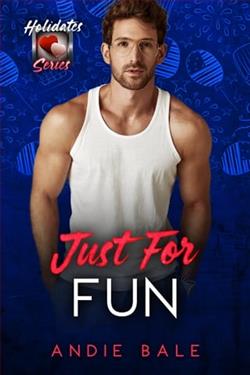Page 6 of The CEO
The detective laughed when I brought him my findings.“You write obituaries, right? Not crime reports?”His dismissal burned, but I kept digging. Three months later, I had enough evidence to force the department to reopen the case. The facility administrator was eventually charged, not with murder, but with fraud and negligence that contributed to her death.
It wasn’t complete justice, but it was something. A validation that my instincts were right—that pursuing truth matters, even when the systems designed to protect it fail.
I review the photos on my camera, and none of them are particularly damning. As far as anyone would assume, Damien Knox was merely taking a business meeting in the park. I squint, focusing on the man he called “Roberts,” trying to see if I recognize him, but I’m drawing a blank. I flip through a few more, and the last one sends a chill through me.
It’s a close-up of Damien and his cold, predatory smile. It’s nothing like the ones he wears in press photos. I roll my eyes, turning my camera off and snapping on the lens cover before placing it back in my bag. My mind races as I try to make sense of what I saw, landing somewhere between “I’m completely making all of this up and it means nothing” and “I might have just captured one of the biggest stories of the century.”
I should delete them. This is stupid. Walk away, and just forget it.
The hair on the back of my neck stands up just thinking about what this could mean. Damien Knox, a man whose net worth exceeds that of most countries, is involved in things far more sinister than anyone probably realizes.
This is bigger than trying to convince the police to look into a murder victim whose obituary I wrote, which sent me down a long, dark trail of police involvement and a cover-up.
This is bigger than trying to get justice for my old neighbor, Lucinda, whose ex continued to assault her, finally putting her in the hospital. His punishment? Probation.
This is even bigger than what happened to my parents.
“Eve? You okay?” The rapping of Ingrid’s knuckles against my window startles me so thoroughly, I actually clutch my chest. “I’m so sorry! I didn’t mean to scare you,” she says, laughing.
I look at my watch again before throwing open my car door.
“Shit, I didn’t realize the time.” I hold my camera bag against my body tightly as I rush to the elevator. I’m more than twenty minutes late back from lunch, and my editor is going to tear my ass a new one.
“Are you sure you’re okay?” Ingrid asks again as we ride the elevator up to our floor. “You look like you’ve seen a ghost.”
“I’m good.” I smile weakly. “I promise, just busy.” I rush through the doors before they’re fully open and sneak back to my desk, making sure to stay out of my boss’ eye line.
For the rest of the day, I keep my head down, too distracted by the thoughts swirling in my head to attempt small talk about what I’ll be doing this coming weekend.
All I want to do is go home, lock my door and spend the entire night researching everything I can find on Damien Knox and The Shadows. Then tomorrow I’ll decide what to do with what I find and what I saw today.
As much as I want this to be my big break—my chance to make a difference and pursue justice—I can’t shake that practical voice in my head (the one that sounds suspiciously like my mother) warning me to let this go.
But for the first time, another voice speaks louder. It’s my father, and I can still picture him, camera in hand, showing me how to capture the right angles and lighting. But he was teaching me something far more valuable than I realized at the time.
“The best photos, Eve, are the ones that capture moments nobody else thinks are significant—moments that change history, moments that tell a story nobody else would believe unless there was photographic evidence to prove it.”
“Thorne!” Brian’s voice cuts through my thoughts the moment I think I’m in the clear for returning late. “My office. Now.”
A few of my coworkers flash me teasing glances as I make my way toward his office. It’s only now that I realize I still have my camera bag slung over my shoulder, my hand clutching the strap tightly.
“Care to explain why you’re allowed to take 90-minute lunches and the rest of us only get an hour?”
He peers over his half-moon glasses, an unamused expression on his face. Brian Morris is a mediocre boss who only got the job because his father was once the editor-in-chief at theTribuneand took the job very seriously. His son, not so much.
“I’m so sorry, sir. I got caught up in something, but I’ll have my deadlines met by the end of the day.” I slide into the chair across from his desk.
“I know you will,” he says with a stern look. “Caught up in what?” He picks up a sheet of paper from his desk and glances over it. “Another one of your expeditions?” He gestures toward my camera bag, his tone mocking.
It’s not enough that he continually ignores my requests to take on any of the freelance photography jobs at work, but he’s also made it a point to frequently remind me that anyinvestigative activitieson my part are not welcome.
“Actually,” I pause, contemplating whether I should even say anything about what I saw . . . but surely he’ll have to recognize that this time, it really is something significant. “I feel like I might have stumbled onto something pretty big.”
Brian sighs, removing his glasses so he can pinch the bridge of his nose. “Eve, we’ve been through this. You’re not a reporter. You’re an obituary writer. If I wanted you investigating shit, I’d have hired you as a journalist.”
“But I could be,” I counter, leaning forward in my seat. “I have the skills, Brian, you know I do.”
“What you have,” he says, pointing at me with his glasses, “is a real skill for being a pain in my ass. Why can’t you have the skills and passion to do yourjob, hmm?” He picks up a folder and plops it down in front of me. “Three more deaths. Need them for tomorrow’s print.”















